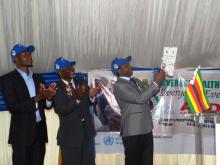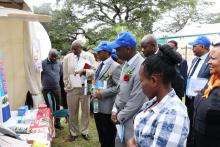Zimbabwe commemorates World Health Day
13 April. Zimbabwe commemorated World Health Day at the WHO compound in an event which saw the commemoration of the 70th anniversary of WHO as well as the launch of the Healthy Ageing Strategy. World Health Day is commemorated on the 7th of April each year to mark WHO’s founding and is an opportunity to draw worldwide attention to a subject of major importance to global health each year. This year marks the 70th anniversary of WHO and the 40th anniversary of the Alma Ata Declaration of 1978 which called for health for all by the year 2000, with this background, this year’s theme is “Universal health coverage (UHC): everyone, everywhere”.
UHC means that individuals and communities receive the health services they need without suffering financial hardships. Zimbabwe chose to focus on Healthy Ageing realising the need to pay more attention on the health of elderly people. The Government of Zimbabwe pledged to focus on the development and maintenance of optimal mental, social and physical well- being of older citizens, where communities are safe for them and health services and community programs are used to prevent and minimise diseases in the elderly, and older people remain a resource to their families, communities and economies.
In a statement, the Honorable Minister of Health and Child Care, Dr David Parirenyatwa said Zimbabwe is solidly behind WHO’s theme of Universal Health Care. He said Zimbabwe’s National Health Strategy aims for a universal health system that provides quality health services for all, particularly through public sector health services and primary health care. He said UHC in Zimbabwe embraces the need to provide all people with access to needed health services including prevention, promotion, treatment and rehabilitation of sufficient quality to be effective at the same time ensuring that the use of these services does not expose the user to financial hardship. “Our planning is focused on equity in service use, service quality improvement and financial protection for all Zimbabweans; in essence access to services for all for primary level health care,” said Dr Parirenyatwa. He however said there are still challenges that need to be addressed moving forward if UHC is to be achieved. These include underfunding of the public health sector; segmentation of health financing; social health insurance taking too long to start; poor quality of care at all levels; inequitable distribution of health facilities especially in new settlement areas, among others, but promised that these challenges are being addressed by the National Health Strategy 2016 – 2020. The representative of the Honorable Minister of Health and Child Care, Dr Gibson Mhlanga used the occasion to launch the National Healthy Ageing Strategy which will guide all the issues to do with the health of the elderly.
The Officer in Charge ai., Dr Prebo Barango read the statement of the Regional Director for World Health Day on behalf of Dr Juliet Nabyonga, OIC Zimbabwe. The statement said that although access to treatment and essential services has improved through major advances in health and health technology, including life-saving medicines for diseases such as HIV/AIDS, tuberculosis, malaria, hypertension and diabetes; much more needs to be done to curb the increase in noncommunicable diseases, address new threats such as SARS, H5N1, and tackle epidemics like Ebola and cholera and the need to address the challenge of antimicrobial resistance and substandard and falsified medicines. “WHO in the African Region is committed to supporting Member States to achieve UHC, and has developed a framework of actions to assist countries in selecting their own path towards achieving both UHC and the Sustainable Development Goals (SDGs); we have also developed a flagship programme geared towards providing integrated and holistic support to countries through implementation support, a regional learning programme for UHC and more,” read part of the statement.
The gathering took time to celebrate the 70th anniversary of the World Health Organization and enjoyed a cake while viewing a video of the history of the World Health Organization. Different exhibitors in partnership with the Ministry of Health and Child Care Non – Communicable Disease Unit mounted exhibitions within the compound where they were providing information on how to stay healthy and curb the development of NCDs.




